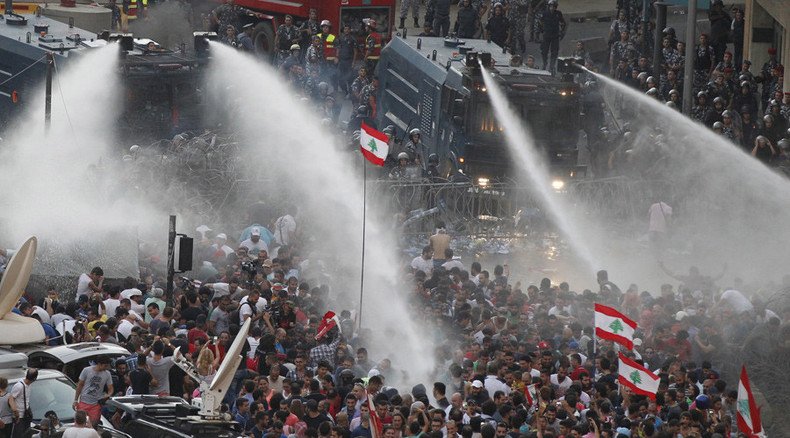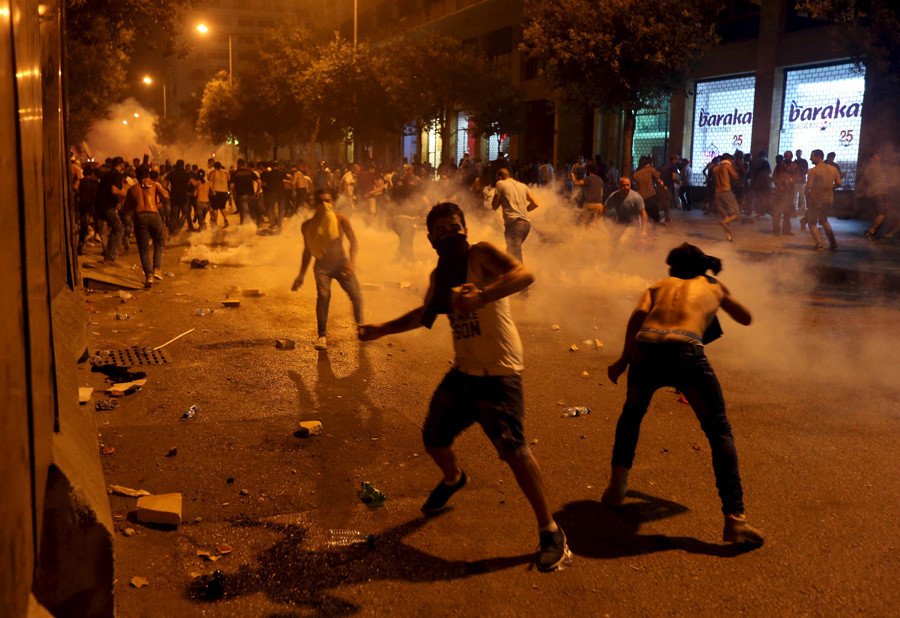Lebanese ‘You Stink’ protests against garbage and oligarchy

The protests in Lebanon are not only about the garbage issue, people are rising against the unfair system of oligarchy which is impoverishing people, says international relations and Middle East expert Kevork Almassian.
Another day of violent street clashes has gripped the capital of Lebanon as part of the ongoing waste collection crisis. Thousands poured into the streets of Beirut rallying against government corruption.
RT: Analysts have said these protests are about much more than just rubbish on the streets. Is that how you see it?
Kevork Almassian: Exactly, I believe this current crisis in Lebanon is not only about the garbage issue or the ‘You Stink’ protest against the government. The root of the problem goes back to the outcome of the civil war in Lebanon in the 90s when they agreed the Taif agreement and the creation of a sectarian government in Lebanon so that every sectarian party represents one of the sects in Lebanon.
The other day my friend was telling me he is an active member in the ‘You Stink’ movement, that they want do a revolution. I was telling him you need…to get rid of all these cantons, all these parties that are creating and making an oligarchy system in Lebanon. They are impoverishing their own people. The poverty is on the highest level. You can see that people are working for $400 per month while others are enjoying a very luxurious life - even in Western countries people don’t enjoy [such luxury]. So in Lebanon there is this division between the people and this oligarch system. The people are asking for employment, for electricity, for water. Imagine that during the week you have to refill your water at least twice per week, although Lebanon is very rich.
RT: Many protesters used slogans from the Arab Spring protests like 'The people want to topple the regime!' How similar are the two protests and is there potential for this one to escalate?
KA: I don’t think this has a relation with the Arab Spring or it’s a continuation of what happened in the Arab countries because the situation in Lebanon – the people were only following their sectarian parties, their sectarian leaders, but now the situation is unbearable for the people. In this hot weather there is no electricity for the people to enjoy the AC, for example. So you can see that the poor people are going on the streets. The leftists, the communists, the liberals – these people said “enough is enough… we don’t need to beg our sectarian leaders for us to get the services.” That’s why the people are rising against this system nowadays. However, in my opinion they also need better organization because the resignation of the government is not enough. If they didn’t change the electoral law in Lebanon, because any other elections will reinstall the same oligarchy system, the same rich people in power.
RT: Lebanon's often praised for being the most religiously diverse society in the Middle East but with political tensions on the rise, could this lead to a sectarian war?
LISTEN MORE:
KA: For the first time in the last couple of years the people are going to the streets without a call of their sectarian leaders. This is a positive sign that we have to take into account, into consideration, that these people are going and telling “no to sectarianism, we want to build a national state based on national identity, not based on sectarian parties.” So I can see a positive side of this. But in my opinion there will be other parties, maybe third parties, who will try to intervene in this protest and try to make trouble between the police and the protesters. If in the coming days there is blood on the ground in Lebanon things will deteriorate. So in my opinion the people of the ‘You Stink’ campaign should make best relations with the police and the army as the Egyptian people did in their last revolution. They should try to attract the police on their side and not to insult them either verbally or by using violence against them, because these people are following the orders of these parties, of the politicians who are afraid of these people, but the duty of these protesters is to try to attract the police on their side against this oligarchy system.

‘Civil society on the brink of collapse’
Middle East expert Paul Heroux suggests that government spending in Lebanon is exceeding revenue, and we are actually looking at a situation similar to Greece where public employees are not getting get their salaries.
RT: The protest leaders are reportedly calling on the crowds to leave the streets, as the situation becomes more violent. How far do you think this unrest will take Beirut?
Paul Heroux: It’s hard to say how far it’s going to go at present because the police are being condemned by the PM, but the people are fed up with what amounts to more than 20,000tons of trash in the streets and this was a problem that was foreseeable. It’s been on the horizon for quite a long time and the inability of the politicians to actually come to some type of alternative landfill site is what this kind of stems from. So one of the core tenets of any civil society is a professional police force. The police force didn’t act completely [without provocation] though; Molotov cocktails were thrown at them earlier on.
RT: There are claims that the protest against the governments' handling of waste collection, which was initially peaceful, has been hijacked. Who could be behind it?
PH: The constitution in Lebanon allows for peaceful protests and the police went to meet those protests and nothing was being done that would have compromised the peaceful protest until it was reported that – and there was some video footage put up by the BBC - protesters threw a couple of Molotov cocktails at the police and the police responded with what’s being called by the PM as “excessive force”. So it’s anybody’s game right now as to who is going to step down first.
RT: Lebanon has been largely stable since the Arab Spring uprising compared to other countries in the region. Could that stability now be at risk?
PH: I think certainly, yes. Lebanon is looking at a credit downgrade right now. Its entire civil society is on the brink of collapse because their revenues are about $10 billion for the government and their expenses are around $15 billion. So we are actually looking at a situation that is not too dissimilar to what we saw in Greece where public employees are just not going to be able to get their salaries and that’s partly what’s happened with this situation. On the one hand landfill was filled up, but on the other hand the trash collectors were not being paid anymore. Lebanon is looking at also a downgrading of its credit from this current B- to a failed state. So there are a lot of unattended consequences that could come of the politicians’ inability to act with basic manners. The ripple effects of this could be quite large.
RT: How is the rise of Islamic State (IS, formerly ISIS/ISIL) in the region affecting Lebanon?
PH: I’m not sure what IS has done in Lebanon at this point with respect to the protests that are going on right now. However, IS looks and feeds on weak governments. We see this in Syria, we see this in Iraq, and if the Lebanese governments continues to dwindle in its power and its influence and if the police undermine their own policing authority by acting against the people with excessive force, I think we can definitely see IS come in and try to fill the vacuum that’s been left by the lack of a functioning government.
The statements, views and opinions expressed in this column are solely those of the author and do not necessarily represent those of RT.
LISTEN MORE:
The statements, views and opinions expressed in this column are solely those of the author and do not necessarily represent those of RT.












